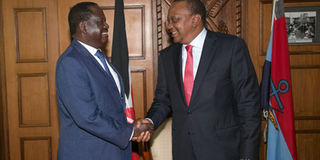Show me ideology in Kenyan politics, I just see a dearth of it

Nasa leader Raila Odinga (left) and President Uhuru Kenyatta reconcile at Harambee House, Nairobi, on March 9, 2018. PHOTO | PSCU
What you need to know:
- To be ethical is to be honest with such strong moral principles that you refuse to change — however inconvenient the situation.
- But Nasa followers’ high regard for Raila dissipated with this handshake that is baffling to friend and foe alike.
The famous handshake that President Uhuru Kenyatta and his hitherto arch-nemesis Raila Odinga gave us is bothersome.
But first, a clarification: I stand for peace. I should, therefore, be over the moon following the events of Friday, March 9, when Uhuru and Raila shook hands on the steps of Harambee House, signalling an end to seven months of political animosity between their followers (and decades-old dynastic rivalry).
Kenyans have been badly divided since September 1, when the Supreme Court, led by Chief Justice David Maraga, historically nullified the presidential result of the August 8, 2017 General Election, citing irregularities and illegalities.
Although National Super Alliance (Nasa) faithful were taken aback when their leader Raila shunned the October 26 fresh election, nothing would have prepared them for the mysterious handshake. Why?
IEBC MSANDO
Independent Electoral and Boundaries Commission ICT manager Chris Msando, who was murdered 10 days to the August poll, was believed to have paid the ultimate price for championing electoral integrity.
Equally, six-month-old Samantha Pendo and Stephanie Moraa, 9, who were killed during the post-election protests, were both victims of perceived electoral injustices.
Indeed, it’s Raila’s calls for electoral justice that appeased his followers and endeared him to them after his abrupt pullout.
It seemed he had finally redeemed himself from the infamous March 18, 2002 NDP-Kanu merger.
Although conspiracy theorists posit that it was a strategy to destroy the ‘Baba na Mama’ Independence party from within, is that what ‘Nasarites’ believe?
IRREDUCIBLE MINIMUMS
Coupled with his “Kibaki Tosha” rallying call that swept Mwai Kibaki to power on December 30, 2002 but turned acrimonious, Raila’s flip-flopping between parties raises serious ethical and integrity questions.
Integrity is the quality of being honest with strong moral principles.
It signifies being whole and undivided to the extent that one would not be swayed by politics of convenience.
To be ethical is to be honest with such strong moral principles that you refuse to change — however inconvenient the situation.
Ethics and integrity are like twins co-joined in honesty.
It’s inconceivable that, only months after the rancour sparked by the August polls and the October repeat that Raila boycotted, demanding irreducible minimums, that there would be “handshakes” without evidence of delivery of the “minimums”.
SWEARING-IN
It seems that Jubilee Party mandarins had long seen through Nasa’s irreducible minimums charade, hence their persistence that there would be no “nusu mkate” (euphemism for a coalition government).
In the aftermath of the 2007/8 post-election violence, international mediators, led by former UN secretary-general Kofi Annan, brokered a deal between then-President Kibaki and Raila that catapulted the latter to the number two slot of one-off prime minister.
With strong indications of ‘Nusu Mkate II’, it’s back to square one.
Nasa supporters resonated with “irreducible minimums” that promised an end to alleged poll theft.
Raila’s ‘swearing-in’ as the ‘people’s president’ on January 30, which saw multitudes throng Uhuru Park, confirms this.
CONSISTENCY
Legal considerations about the mock inauguration notwithstanding, the huge turnout was a statement of endorsement of principled leadership.
Raila signified a leader who was ready to die for his beliefs — especially after his Nasa co-principals deserted him in a most shameful act of cowardice.
But Nasa followers’ high regard for Raila dissipated with this handshake that is baffling to friend and foe alike.
The handshake signifies lack of principled leadership, which has seen parties come and go with every other election.
Until our leaders shun the ‘nusu mkate’ mentality and embrace leadership with a cause, we will continue witnessing farcical situations that bespeak ideological poverty.
And sticking with one’s party is not impossible.
LEADERSHIP
Uganda’s Democratic Party leader Paul Ssemogerere stuck with his party for 25 years, until he retired, without selling out to President Yoweri Museveni.
The same applies to the United Kingdom, where party leaders give room for fresh blood when they fail to deliver.
The Opposition plays a key role in national governance. When the bastion of Kenyan opposition politics abandons his ‘house’ for a feather bed in the camp with a contrasting ideology, many feel left out.
As the Swahili sage said, Usiache mbachao kwa msala upitao (Don’t abandon your modest prayer mat for an elegant borrowed one)!
Ms Kweyu is a freelance journalist and consulting editor. [email protected]




